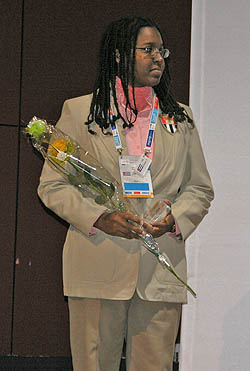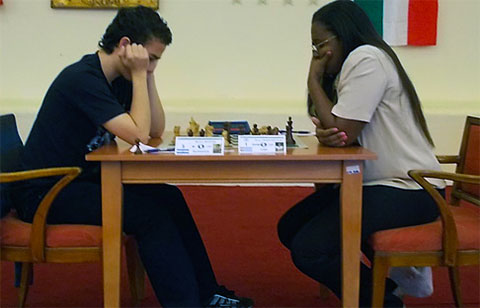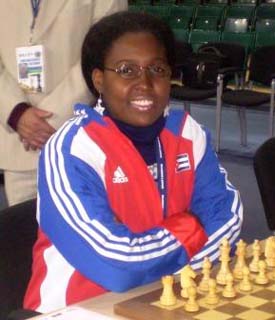Cuba’s Oleiny Linares making strides!









Cuba is a country of complex history and culture. With a mixture of tradition stemming from Taino Arawak roots, Spanish colonialism and African lineage, the country of more than 11 million has a sense of pride that appears infectious. That same pride is taken in many areas such as scholarship, music, sport and art. One of the art forms that is highly revered in Cuba is chess. With a rich tradition stemming from the world championship of José Raúl Capablanca, chess has become fully integrated as a national pastime.


WGM Oleiny Linares Nápoles
Born in the region of Santiago de Cuba in 1983, Linares hails from the same region of the great Afro-Cuban revolutionary, Lt. General José Antonio de la Caridad Maceo y Grajales… or simply Antonio Maceo. It is also the place where national hero Jose Marti is buried and incidentally Linares lives in the district bearing his name. There are a large number of Afro-Cubans in the city of Santiago de Cuba and Linares is one “Santiaguera” who has shined on the chess scene. Born June 27th, 1983 in Santiago she is a veteran of three Olympiad tournaments and has won several national titles. She earned the Women FIDE Master (WFM) title in 2000.














In 2012, Cuba was unable to repeat the success of the previous Olympiad and came in 19th despite only two losses. Both Linares (who was pregnant) and Lisandra Ordaz Valdes scored 6/10 at the 2012 Istanbul Olympiad (Linares on board #3). She won Havana’s Concluyó la Copa Giraldilla with 6.5/9. In this year’s women’s national championship, she came in joint 4th with the legendary WGM Maritza Arribas winning her 10th title.
In March of this year, Linares competed in the Capablanca Memorial, the annual tournament that attracts some of the world elite including Vassily Ivanchuk. The tournament is comprised of two sections: the Elite section, a near-2700 level tournament and the Premier section which is comprised of strong master-level players. While Hungarian Grandmaster Zoltan Almasi won the Elite section with 6.5/9, Linares won the Premier section with 7/9 with superior tiebreaks over IM Carlos Davila. In doing so, she scored a second IM-norm and it confirms the fact that women competing in the strongest available fields can yield good results.


Linares winning 1st at the 2013 Capablanca Memorial.
Linares can be considered one of the strongest players of African ancestry (male or female), but most certainly the strongest woman. It goes without saying that the success of this talented Afro-Cuban woman should not go unnoticed despite the lack of exposure Cuba gets in the mainstream western media. In addition, it is noted that her success should encourage women to come out of the comfort of playing solely in women’s tournaments since there are no limitations that would normally occur if brute strength were required.
A proud mother of two daughters (Mirtha Esther and Faith Victoria) with a supportive husband, she represents all that is good about chess and provides inspiration for those who may believe there are limitations of race and gender in the chess realm. Cuba is a country of intrigue and nostalgic beauty. It is a country with a complex geopolitical and sociocultural landscape, yet it is a country presenting many examples of resourcefulness and opportunism.

Rogelio Ortega is a name Linares must surely know. As the 1958 and 1966 national champion of Cuba, he served as a trailblazer in times where master-level players of African descent were rare. Ortega traveled the world competing against legends like Semyon Furman, Saloman Flohr, Max Euwe, Wolfang Uhlmann and Vlastmil Hort. Despite the height of Cuba-U.S. political tension, he traveled to the U.S. to play in the 1959 U.S. Open. He is honored by a memorial tournament in Cuba every year.
The aforementioned Afro-Cuban Antonio Maceo is honored on the Cuban peso and considered a national hero. More than 100 years later, we find another Afro-Cuban from the same city serving not as a soldier, but an ambassador of a sport that ofttimes is very exclusive. It is with such an example that Oleiny Linares Nápoles can continue her quest for excellence in chess and help present a picture of chess that is universal and more inclusive.

very nice article Daaim…informative and inspiring!…
It took me a while to understand why this web site portraits the talent of WGM Olenis Linares and not other cuban female players. After a while, after seeing so many references to the word afro, the design&name of the site and other stories, I was able to understand that the reason is because she is a good player and BLACK.
I guess i dont have any problem with that but in my view [maybe limited since I am a cuban who happens to be white] dedicating a site to highlight the accomplishments of black players divide instead of uniting. In Cuba you will never see that; If you are black, white or in between and you are good, you are simply good not a black player that happens to be good or viceversa.
Seeing the world in black and white seems like an extremism in my book. It was positive and needed in the past (civil right movement comes to mind); but the world is evolving, racial discrimination is a matter of the past as far as institutions and most laws are concerned (the mind of some people evolves slower but evolves nonetheless), so why concentrating in only a category of players according to race? What about if white players create a website for only white players? Everybody would call KKK or racism, deservedly so by the way. My advice, try to widen your scope and start targeting chess as a sport regardless of race.
No matter how hard you try, there will always be people who will never grasp matters of race because their lack of understanding stems from something deeper than ignorance. I’d just say if your website is being attacked for also covering the achievement of black chess players, you must be doing something right.
I agree 100% with Guy, Daaim. Keep doing the good work you are doing. You will always have haters. It’s only when people STOP attacking you should you begin to worry 🙂
Peace !
In my opinion, it’s a waste of your time to spend your energy to defend the good work that you are doing to an individual who shoots before aiming.While I enjoy hearing what players from all parts of the world are accomplishing, what I love to hear the most is what my brothers in Africa and the Caribbean are achieving.It’s exciting to hear good news about a neighbor but it’s even better to receive good news about a son.
In fairness, Jose boldly raised points of interests which should be appreciated only to illustrate his personal lack of understanding. I think his question is, Why a Chess Drum site centered on the promotion and achievements of groups/individuals who acknowledge their African heritage. Maybe we should ask Jose why he describe himself as “Cuban” and “White”. I wonder if Jose knows he might not normally be considered as “white” in the USA and enjoy special societal privileges expected and bestowed upon individual of European heritage.
I do agree with Jose in that we should see the world in more than a white and black perspective. I personally do not use these term in representation of other individuals. Historically, they are used and associated with the presumption of privileges or lack of privileges. I personal challenge Jose (and all others) to look beyond the “white and black ” label and see their true heritage and appreciate the heritage of others. Believe me it is easier to make friends this way or at least understand the perspectives of others?
cpercy